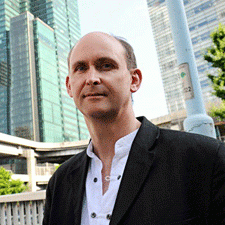Robert Fripp is a guitarist best known as the driving force behind the mighty progressive rock band King Crimson.
He has also collaborated with David Bowie (think of the heavenly sustained guitar in the song “Heroes”), Peter Gabriel, Daryl Hall, Andy Summers, and many others.
And starting with his early recordings with Brian Eno, he also pioneered the tape looping system Frippertronics, creating ethereal soundscapes and ambient pieces. Fripp greatly expanded his audience during the pandemic in a series of quirky videos with his wife Toyah.

David Singleton is Fripp’s “reluctant manager.”
Well, of course, Singleton is much more than this. He is also a producer for the music of King Crimson and for the recent acclaimed documentary “In the Court of the Crimson King,” an audio engineer, author of “The Vicar Chronicles” about the music business, co-founder of the Discipline Global Mobile music label, and a musician himself.
Fripp and Singleton are coming to the New Vic Theatre in Santa Barbara for “An Evening With Englishmen Abroad” on Friday, March 1. They’ll be answering whatever “burning questions” that the audience brings — the stranger the better.
Even if you’re not familiar with King Crimson, this promises to be a lively, humorous, and profound evening. Tickets are available here https://etcsb.org/whats-on/community-events/.
David Singleton talked to Noozhawk about the upcoming event.
Jeff Moehlis: Can you describe what this event is, what people can look forward to?
Singleton: Well, this is an open evening with Two Englishmen Abroad. It’s a chance for us to answer questions that people come to ask, and actually to address questions that interest both Robert and me anyway.
I think we both find it fun because it is a very open evening. We don’t come with an agenda. We have lots of things we can talk about if the audience aren’t inspired to take us off in interesting directions. But when we did a tour on the East Coast before, they were most exciting in fact when you were taken off in directions you hadn’t considered before.
It’s an improvised evening, would be the best way of putting it. You know, if you came to two nights, I don’t think you’re going to hear us discussing the same things. In fact, I’ve listened back to recordings of what we did last time around — they go on for about two hours — and you could listen to everyone because what we talked about was entirely different every night.
So this isn’t sort of a pre-rehearsed ritual where we’re going to come and promote something. This is an open evening, loosely talking about music.
My favorite comment that was made was from somebody who came to the show in New York, and told me afterwards that it was astonishing because there wasn’t any music — it was just people talking about music – but “when I left, I had music in my head as if I’d been to a music concert.”
So I love the chance to explore what is this magical thing which we’re all obsessed by. What is music? Probably everybody who comes will have had an epiphany, a moment when music was the unique thing that spoke to them in their lives.
It’s wonderful to explore what it is. Why does music have that power?Robert said to me, “Well David, what are you going to talk about in your introduction?” I said, “Music is the language of the soul. Let’s see where that takes us.”
I’ve noticed when I watched the past shows, particularly when you do get asked the questions that you think are fascinatingly strange, is that Robert developed a wonderful habit of saying, “Good question. What do you think David?” [both laugh]
JM: Of the questions and answers that you’ve been a part of, what has surprised you about Robert?
DS: There were various reasons why I was very keen to do this. One of the reasons was that I think Robert speaks about music, and the role of the musician, and the relationship between the musician and music and the audience, he has thought about that and speaks about it I think more clearly and beautifully than anyone I know.
So part of my agenda was to find a space where that might happen, and people could hear Robert talking about it. So I’m not surprised by what I hear, because I know these are things that Robert has thought, and I’ve heard him say some of them before, but it’s wonderful to hear Robert constantly exploring what is the nature of that relationship and how does it work.
Where does music come from? What do musicians do? How does music come into the world? The act of composition. Probably those are the bits that live with me, because I think there’s a truth in them, and they resonate with the audience.
I think Robert and I hopefully complement each other, because Robert speaks incredibly well about that, and the part that I suffer with, which is probably well-known to all the wanna-be artists in the audience, which is probably most of them I would argue, is what I describe as bridging the gap.
What it takes to take the perfect idea that you have in your head, the perfect conception, the perfect newspaper article that you haven’t written yet [laughs], what it takes to take that and bring it into the real world, where inevitably it’s imperfect.
There is always an imperfection in the translation between the one and the other. That is, I think, a problem that most artists wrestle with on a daily basis. So I think talking about that and trying to help people who are trying to produce their own things, to see that and get over that hump is, I think, something else that is interesting to do.
For the full interview with David Singleton, click here.




